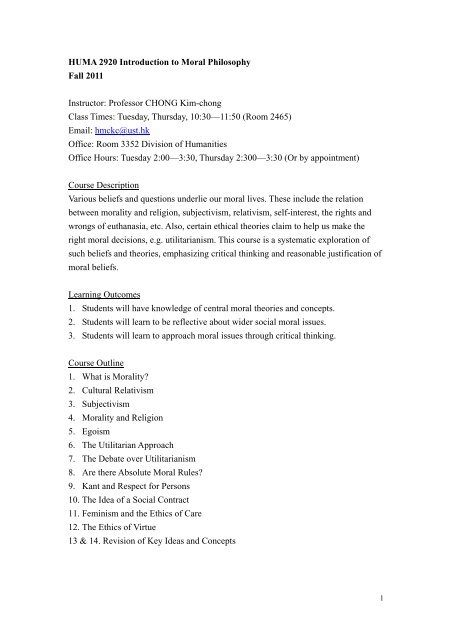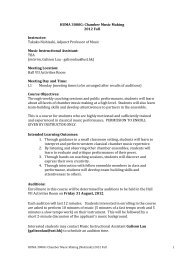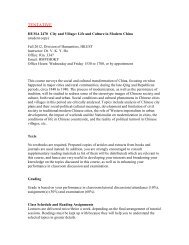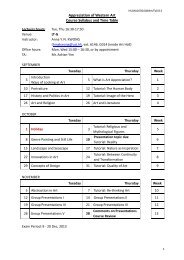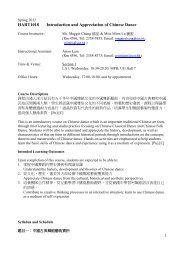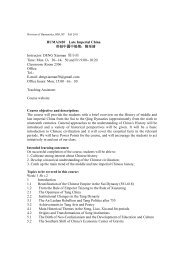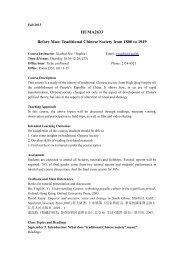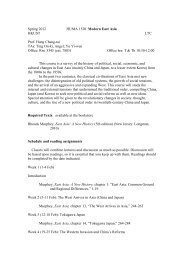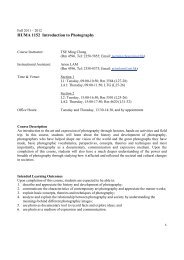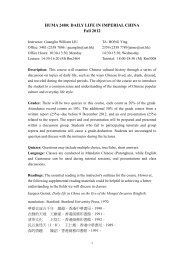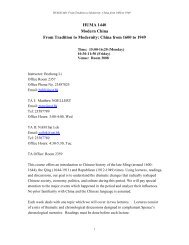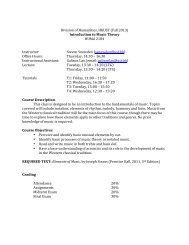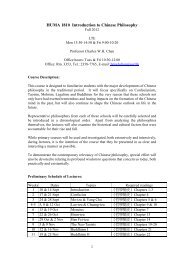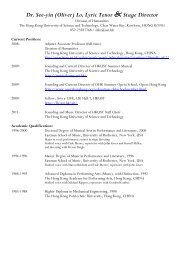HUMA 2920 Introduction to Moral Philosophy Fall 2011 Instructor ...
HUMA 2920 Introduction to Moral Philosophy Fall 2011 Instructor ...
HUMA 2920 Introduction to Moral Philosophy Fall 2011 Instructor ...
- No tags were found...
You also want an ePaper? Increase the reach of your titles
YUMPU automatically turns print PDFs into web optimized ePapers that Google loves.
<strong>HUMA</strong> <strong>2920</strong> <strong>Introduction</strong> <strong>to</strong> <strong>Moral</strong> <strong>Philosophy</strong><strong>Fall</strong> <strong>2011</strong>Instruc<strong>to</strong>r: Professor CHONG Kim-chongClass Times: Tuesday, Thursday, 10:30—11:50 (Room 2465)Email: hmckc@ust.hkOffice: Room 3352 Division of HumanitiesOffice Hours: Tuesday 2:00—3:30, Thursday 2:300—3:30 (Or by appointment)Course DescriptionVarious beliefs and questions underlie our moral lives. These include the relationbetween morality and religion, subjectivism, relativism, self-interest, the rights andwrongs of euthanasia, etc. Also, certain ethical theories claim <strong>to</strong> help us make theright moral decisions, e.g. utilitarianism. This course is a systematic exploration ofsuch beliefs and theories, emphasizing critical thinking and reasonable justification ofmoral beliefs.Learning Outcomes1. Students will have knowledge of central moral theories and concepts.2. Students will learn <strong>to</strong> be reflective about wider social moral issues.3. Students will learn <strong>to</strong> approach moral issues through critical thinking.Course Outline1. What is <strong>Moral</strong>ity?2. Cultural Relativism3. Subjectivism4. <strong>Moral</strong>ity and Religion5. Egoism6. The Utilitarian Approach7. The Debate over Utilitarianism8. Are there Absolute <strong>Moral</strong> Rules?9. Kant and Respect for Persons10. The Idea of a Social Contract11. Feminism and the Ethics of Care12. The Ethics of Virtue13 & 14. Revision of Key Ideas and Concepts1
Assessment of Student Learning1. First Quiz 20%2. Second Quiz 20%3. Presentation 20%4. Essay 40%(1) The quizzes will test the students’ grasp of the concepts discussed in class and inthe texts. They will consist of multiple choice questions and some questions whichrequire short written answers.(2) Students will be assigned a <strong>to</strong>pic for presentation. They will be assessed on clarity,grasp of arguments for and against a particular issue, depth of discussion, originality,research done, etc.(3) Essay requirements—these will be specified later in the course. The essay is <strong>to</strong> bewritten in English.Required ReadingsJames Rachels, The Elements of <strong>Moral</strong> <strong>Philosophy</strong> (Bos<strong>to</strong>n: McGraw-Hill, 2010) 5 thedition.Michael Sandel, Justice—What’s the Right Thing <strong>to</strong> Do? (New York: Penguin Books,2010).Both the above readings are available in “Reserve” in the library. They may also bepurchased from the campus books<strong>to</strong>re.ReferencesPeter Singer, How are we <strong>to</strong> live—ethics in an age of self-interest (New York:Prometheus Books, 1995)Louis P. Pojman, Ethics—Discovering Right and Wrong (Singapore: WadsworthThomson Learning, 2002, 4 th edition).Peter Singer, edited, Ethics (Oxford University Press, 1994).The above references are available in “Reserve” in the library.2


